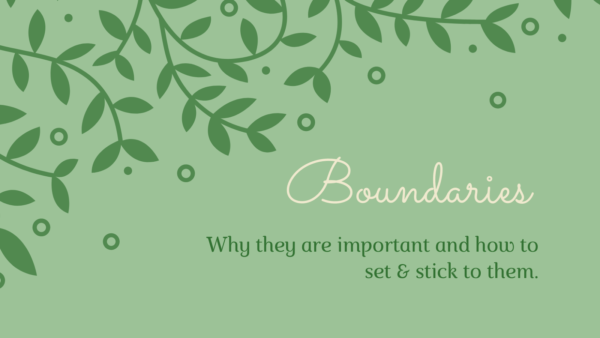 Let’s talk about boundaries. What are boundaries, what are the types of boundaries, why are they important, how do we set them for ourselves, setting consequences, etc. Boundaries are rules, limits, or guidelines someone sets in order to let others know what they are comfortable with and what they are not comfortable with. Boundaries are to identify ways for other people to behave towards them and what will happen if those boundaries are broken. Setting healthy boundaries in a relationship creates a good foundation for a healthy relationship. When we set boundaries for ourselves, specifically in a relationship, we are allowing our partner to understand and respect us.
Let’s talk about boundaries. What are boundaries, what are the types of boundaries, why are they important, how do we set them for ourselves, setting consequences, etc. Boundaries are rules, limits, or guidelines someone sets in order to let others know what they are comfortable with and what they are not comfortable with. Boundaries are to identify ways for other people to behave towards them and what will happen if those boundaries are broken. Setting healthy boundaries in a relationship creates a good foundation for a healthy relationship. When we set boundaries for ourselves, specifically in a relationship, we are allowing our partner to understand and respect us.
There are many different types of boundaries that we can set for ourselves, including: physical, time, conversational, relationship, and personal.
- Physical Boundaries are boundaries we set for ourselves to ensure physical safety and proximity, including boundaries surrounding sexuality, where and when we go places, and what we are comfortable with physically from others.
- Time Boundaries are what we set to create a healthy mindset and schedule for ourselves. This can include setting limits on how much time we spend with someone or doing a certain activity and setting time boundaries for work/school and home life balance.
- Conversational Boundaries are setting limits about what topics we are open to discussing and what topics we do not feel comfortable talking about. This can include many different topics, such as politics, religion, sexual content, and many more.
- Relationship Boundaries are limits that are discussed and agreed upon with your partner, family, coworkers, and close friends.
- Personal Boundaries are guidelines and rules we set for ourselves to ensure we are being aware of our needs and being aware of how we can respect and meet those needs in a healthy way.
Now that we know a few different types of boundaries that we can set for ourselves, let’s talk about why it is important to have boundaries. Boundaries create guidelines and rules for yourself and others to understand, follow, and respect. Some advantages of setting healthy boundaries can include a healthy mindset, refraining from burn out, implementing respect into your daily life, and good emotional and mental health. Now, let’s pick a few types of boundaries to go over and set. I am going to discuss Physical and Relational boundaries but feel free to go through all of these types of boundaries and create your own. To start off, we need to define the boundary we want to set. An example could be creating a physical boundary with our family members to respect your privacy in your room when the door is closed. Another example could be setting a relationship boundary with your partner that you do not want to do anything other than holding hands and hugging until you feel comfortable and ready to have a conversation with them about further physical contact. Once we have the boundary defined, we then need to communicate that boundary with the correct people. For the two examples listed above, this could look like putting a sign on your bedroom door that says “knock before entering” or “do not disturb”; for your relationship boundary this could look like having a conversation with your partner about what you are comfortable and not comfortable doing in regards to sexual activity. After we communicate the boundaries we have set with the people we want to, we should set consequences if those boundaries are broken. This could be refraining from engaging with them, allowing another conversation to be had, or discussing why these are important and what the consequence will be if it is ever broken again.
Boundaries differ from person to person and can always change. Setting your boundaries can be a great starting point to have a healthy relationship with a partner, boss, family member, teacher, coworker, and anyone that you engage with. If you are ready to start making your boundaries, start by setting one boundary with one person or one activity. Keep adding from there until you feel safe and comfortable in your daily life!
Written by Dana Drozek, Education and Outreach Specialist
All ZCenter blog posts are written by state certified staff, interns, and volunteers. For questions on authorship or content, please email kjones@zcenter.org.

